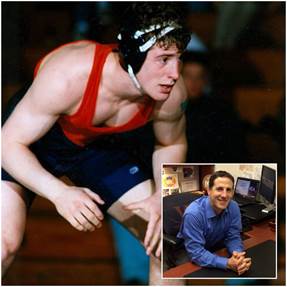Failure and the Path to Success
Guest blog post by Jim Harshaw.
In the fall of 2012, I pulled the plug on my business.
I labored at it for years but it was now clear that it would fail. It was a terrible feeling. Like years of time and money have been wasted.
I’ve felt that feeling before.
It was March 20, 1998. In front of 14,000 fans at the Convocation Center in Cleveland Ohio, I failed to reach my goal of becoming a Division I All American. Years of time and money that had been invested felt like they’d been wasted. I found myself in the locker room, my face buried in a towel in tears wondering why I can’t do this. “What’s wrong with me?,” I thought. “I couldn’t possibly have worked any harder. I couldn’t have run more miles or lifted more weights or watched more film. There weren’t enough hours in the day.”
Such is the emotional reaction to failure. “Failure is an event,” they say, “not a person.” But when we fail, we feel like we’re not good enough or not smart enough or not capable enough. The result is self-doubt and a deep questioning as to whether we’re taking the right steps and on the right path. We question if we are working on the right things, whether business or sports or otherwise.
“Failure is an event,” they say, “not a person.” But when we fail, we feel like we’re not good enough or not smart enough or not capable enough. The result is self-doubt and a deep questioning as to whether we’re taking the right steps and on the right path. We question if we are working on the right things, whether business or sports or otherwise.
Our self talk, whether conscious or subconscious, turns negative.
Our goals are lowered.
Our self-confidence shaken.
We see our next-door neighbor with the new car or the guy down the hall getting a promotion or the athlete on TV winning the gold medal. We see others plant their flag atop the mountain of success but wonder why we’re stuck part way up.
“It must be easy for him,” you think to yourself.
But have you ever talked to him?
Have you ever asked him about his failures and obstacles and struggles and set backs?
About the anguish and pain and suffering he endured to plant that flag?
Have you asked him about the mundane daily habits on which he toiled in obscurity for years that led to that moment?
Have you asked him about the times of hopelessness and self-doubt and despair?
Probably not, because it’s easier that way.
It’s easier to believe that the path was clear for him. It’s easier to believe that the obstacles in front of you are unique. It’s easier to believe that his genetics or upbringing or family wealth or lack thereof gave him the edge, motivation or drive that you just don’t have.
“He was lucky.”
It’s easier to believe that. But I’ve learned the truth. On my podcast, Wrestling with Success, I interview CEOs, astronauts, billionaires and professional athletes and I ask them about their journey. I ask them about their struggle. I ask them about their failures. And I ask them about their habits.
What I discover is ordinary people taking extraordinary action in the face of failure. I find ordinary people who are willing to get up one more time, every time after each setback. I find people willing to do the extreme just to have a shot at the title or the deal or the success that most only dream of.
Your success, too, will be the result of your resilience.
Your success will be the result of your ability to control yourself talk.
Your success will hinge upon the failures that become stepping stones on your path.
Your success, like everyone else’s, will require pain and suffering and discipline along the way, just like Wayne Kurtz. Just like the guy down the hall.
This is precisely why your success will be endlessly gratifying and deeply fulfilling. I look forward to seeing you atop the mountain.
About the author: Jim eventually reached his goal of becoming an All American his senior season. He’s learned that failure, struggle and setbacks are not only an inevitable part of life but a necessary step on the path to success. A speaker, coach and podcast host, Jim Harshaw shares powerful stories to empower his clients and audiences to overcome their own challenges and achieve success despite their inevitable failures. Learn more at: http://www.JimHarshawJr.com

